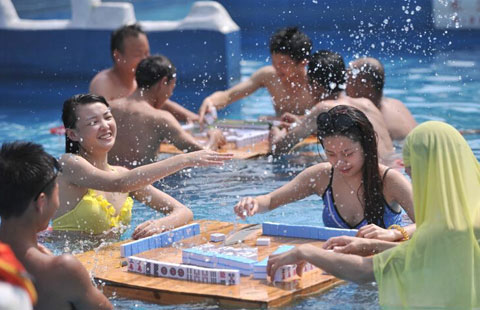Don't let war history repeat itself
Updated: 2014-07-26 09:24
By Yang Bojiang (China Daily)
|
|||||||||||
Japan must realize that its leaders' militarist policies caused the country's downfall and that the future belongs to peace
The First Sino-Japanese War that broke out on July 25, 1894 because of Japan's provocation was a turning point in China-Japan relationship of more than 2,000 years. Traditionally known as the "Celestial Empire", China astoundingly met its Waterloo in the one-year war with "small" Japan. The war altered not only the East Asian and international order, but also the destinies of the two countries.
To some extent the ignominious defeat in the war did serve as a wake-up call for China. But Japan's victory disintegrated the traditional Sino-centric suzerain-vassal system in Asia and replaced it with flagrant colonialism led by Western powers and shared by Japan. Following the dramatic decline of its international leadership, China along with the whole Far East became a major victim of the expansionist policies of major powers, including the United States, the United Kingdom and an increasingly militarist Japan.
As the victor of the First Sino-Japanese War, Japan demanded huge "reparations" and forced China, then ruled by the Qing Dynasty (1644-1911), to sign the unequal "Treaty of Shimonoseki" in 1895. The reparations, in more ways than one, helped Japan strengthen its economic, military and educational foundations, and dealt a deadly blow to China's economy and territorial integrity.
After winning another war with Russia on China's land at the beginning of the 20th century, Japan revealed its naked militarist designs by invading more Asian countries such as Korea. Encouraged and lured by Japan's "fruitful" aggressive campaigns, more Western imperial powers flocked to China to grab territories (on the pretext of taking them on lease) and usurp the ownership of railways and mines, dealing a blow to China's sovereignty.
The First Sino-Japanese War and World War II are important lessons for China and Japan both: only if a country's rise is peaceful can it achieve continued success.
Japan's humiliating defeat in World War II can be attributed to its leaders' bloated ego and dream of ruling the Asia-Pacific. In contrast, China's defeat in the 1894-95 war can be attributed to its weak economy and military, and flawed political system compared with those of Japan. It is thus fair to conclude that the rise and restoration of a country is based on successful institutional reforms, not on militarist and expansionist policies.
Related Stories
Japan reopens China's wounds 2014-07-25 08:14
Japan war criminal's confession recounted 2014-07-23 07:34
China-Japan friction saves 'comfort women' houses 2014-07-18 13:53
China urges Japan over political obstacles 2014-07-15 20:56
Today's Top News
TransAsia crash while landing in Taiwan
UK fraud office liaising with China on GSK bribery case
Death toll in Gaza mounts to 701
Meat supplier in global crisis
Dogs 'capable' of feeling jealousy
Five detained over stale meat scandal
5 more universities set up human rights centers
Rebels likely downed jet 'by mistake'
Hot Topics
Lunar probe , China growth forecasts, Emission rules get tougher, China seen through 'colored lens', International board,
Editor's Picks

|

|

|

|

|

|





